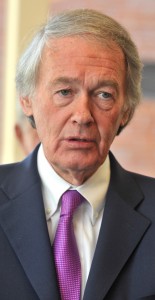STEVE LeBLANC, Associated Press
BOSTON (AP) — One is serving two life sentences after a 2013 racketeering conviction tied him to 11 murders and other gangland crimes in the 1970s and ’80s. The other has acknowledged taking part in the Boston Marathon bombing.
The crimes shocked Boston, but with cameras banned in federal courts, ordinary Bostonians have been denied a chance to watch the ongoing trial of Dzhokhar Tsarnaev, as they were during the trial of James “Whitey” Bulger two years ago.
Instead they’ve had to rely on the drawings of courtroom artists or descriptions by reporters.
While Congress could take action to press the courts to open up trials to cameras — a number of current bills would do just that — the future of those bills is uncertain.
The Associated Press reached out to members of Massachusetts all-Democratic congressional delegation and found a range of views, from lawmakers eager to open up the courts to cameras to others worried about the intrusive nature of media.
Sen. Edward Markey and Rep. Stephen Lynch are among the more enthusiastic supporters of courtroom cameras.
Lynch has co-sponsored a House bill that would require the Supreme Court to allow television coverage of all open sessions unless the justices vote that allowing cameras would violate the due process rights of those involved in a particular case.
“There is great civic value in having trials telecast,” Lynch said, adding that having a visual record of a trial could be helpful if an appeal is raised.
Markey has co-sponsored a similar bill in the Senate that would let the presiding judge in all federal courts — including the Supreme Court — allow cameras while also protecting the identities of witnesses and jurors. The bill would ban coverage of private conversations between clients and lawyers, opposing attorneys, and lawyers and the judge.
Other members of the delegation seemed they needed to consider the pros and cons of courtroom cameras.
Rep. Joe Kennedy, a former assistant district attorney, said through an aide that he believes in public access to the justice system, but is mindful of the need to project the privacy of witnesses and jurors.
Rep. Niki Tsongas agreed that the importance of public access and involvement in the judicial system needs to be weighed against concerns about privacy and safety.
“I hope my colleagues and I have an opportunity to debate the subject fully,” she said.
The state’s two newest members of Congress — Reps. Seth Moulton and Katherine Clark — also said that while they support transparency in the courtroom, they’re concerned about safety and privacy of those participating in trials.
Other members of the Massachusetts delegation were less enthusiastic.
Rep. William Keating, a former Norfolk County District Attorney, said judges should be final arbiters about whether to allow cameras.
“The option should be available to all judges who wish to utilize it, but there also must be discretion for judges to prohibit them in specific circumstances,” he said.
An aide to Rep. Michael Capuano said the congressman had reservations about allowing cameras in federal courtrooms, particularly if they could harm the safety or privacy of witnesses. A spokesman for Rep. Richard Neal said he also believes the choice of allowing courtroom cameras should be left up to the judge.
Two members of the delegation — U.S. Sen. Elizabeth Warren and Rep. James McGovern — did not respond to requests for comment.
The absence of cameras at the trial of Tsarnaev stands in contrast to another ongoing high-profile criminal proceeding in Massachusetts — the murder trial of former New England Patriots player Aaron Hernandez. Cameras are allowed in state courtrooms.
The view of Massachusetts Attorney General Maura Healey has evolved.
Last week, Healey said she didn’t have a particularly formed view on the issue.
Speaking on Boston Herald Radio Monday, Healey said cameras should be allowed in courtrooms in some cases, including the Tsarnaev trial.
“I think that in this case where it is such a public and publicly-involved case that it would be appropriate,” she said. “I find it troubling that our Supreme Court is so reluctant to allow cameras or even allow real-time recording to be done.”



